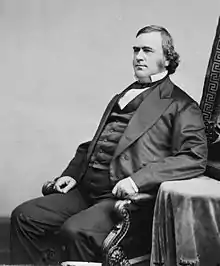Willard Saulsbury Sr.
Willard Saulsbury Sr. (June 2, 1820 – April 6, 1892) was an American lawyer and politician from Georgetown, Delaware. He was a member of the Democratic Party, who served as Attorney General of Delaware, U.S. Senator from Delaware and Chancellor of Delaware.
Willard Saulsbury Sr. | |
|---|---|
 | |
| Chancellor of Delaware | |
| In office November 14, 1873 – April 6, 1892 | |
| Preceded by | Daniel M. Bates |
| Succeeded by | James L. Wolcott |
| United States Senator from Delaware | |
| In office March 4, 1859 – March 3, 1871 | |
| Preceded by | Martin W. Bates |
| Succeeded by | Eli Saulsbury |
| 10th Attorney General of Delaware | |
| In office 1850–1855 | |
| Governor | William Tharp William H. H. Ross |
| Preceded by | Edward W. Gilpin |
| Succeeded by | George P. Fisher |
| Personal details | |
| Born | June 2, 1820 Kent County, Delaware |
| Died | April 6, 1892 (aged 71) Dover, Delaware |
| Political party | Democratic |
| Spouse | Annie Ponder |
| Relations | Eli Saulsbury (brother) Gove Saulsbury (brother) |
| Children | 3, including Willard Jr. |
| Residence(s) | Georgetown, Delaware |
| Alma mater | Delaware College |
| Profession | Lawyer |
Early life and family
Saulsbury was born in Mispillion Hundred, Kent County, Delaware, son of William & Margaret Ann Smith Saulsbury. He was a younger brother of Governor Gove Saulsbury and U.S. Senator Eli Saulsbury. He married Annie Ponder, sister of Governor James Ponder, and they had three children, John Ponder, Margaret, and Willard Jr. They were members of the Episcopal Church. Saulsbury was educated at Dickinson College and Delaware College, which is now the University of Delaware, studied law, was admitted to the Delaware Bar, and began his practice in Georgetown, Delaware. He was a slaveholder.[1]
Political career
Saulsbury was the Delaware Attorney General from 1850 until 1855, and was elected to the United States Senate in 1858, defeating incumbent U.S. Senator Martin W. Bates. Saulsbury was reelected in 1864, but was defeated for a third term in 1870 by his older brother, Eli Saulsbury. He served two full terms from March 4, 1859, to March 4, 1871. He then continued his law practice and served as Chancellor of Delaware from 1873 until his death in 1892.
In 1863, Saulsbury was a vehement critic of President Abraham Lincoln's administration. Opposing the war in general and the suspension of habeas corpus specifically, Saulsbury attempted to prevent a vote sustaining that controversial executive order. Apparently intoxicated, Saulsbury verbally attacked the President on the Senate floor in what John Hay described as "language fit only for a drunken fishwife". Senator Saulsbury called Lincoln "an imbecile" and stated that the President was "the weakest man ever placed in a high office". When Vice President Hannibal Hamlin called Saulsbury to order, the Senator refused to take his seat. Finally, the Senate's sergeant-at-arms approached to remove Saulsbury from the Senate floor when the Senator suddenly brandished a revolver, placed it against the sergeant's head and said, "Damn you, if you touch me I'll shoot you dead!" Eventually, Saulsbury was calmed and removed from the Senate floor.[2]
Death and legacy
Saulsbury died at Dover and is buried there in the Christ Episcopal Church Cemetery. His son Willard Saulsbury Jr. was also a U.S. Senator.
Almanac
The General Assembly chose the U.S. Senators, who took office March 4 for a six-year term.
| Public Offices | ||||||
|---|---|---|---|---|---|---|
| Office | Type | Location | Began office | Ended office | notes | |
| Attorney General | Executive | Dover | 1850 | 1855 | Delaware | |
| U.S. Senator | Legislature | Washington | March 4, 1859 | March 3, 1865 | ||
| U.S. Senator | Legislature | Washington | March 4, 1865 | March 3, 1871 | ||
| Chancellor | Judiciary | Dover | November 14, 1873 | April 6, 1892 | State Chancery Court | |
| United States Congressional service | ||||||
|---|---|---|---|---|---|---|
| Dates | Congress | Chamber | Majority | President | Committees | Class/District |
| 1859–1861 | 36th | U.S. Senate | Democratic | James Buchanan | class 2 | |
| 1861–1863 | 37th | U.S. Senate | Republican | Abraham Lincoln | class 2 | |
| 1863–1865 | 38th | U.S. Senate | Republican | Abraham Lincoln | class 2 | |
| 1865–1867 | 39th | U.S. Senate | Republican | Abraham Lincoln Andrew Johnson |
class 2 | |
| 1867–1869 | 40th | U.S. Senate | Republican | Andrew Johnson | class 2 | |
| 1869–1871 | 41st | U.S. Senate | Republican | Ulysses S. Grant | class 2 | |
References
- Weil, Julie Zauzmer; Blanco, Adrian; Dominguez, Leo. "More than 1,800 congressmen once enslaved Black people. This is who they were, and how they shaped the nation". Washington Post. Retrieved 2023-04-26.
- "The Battle of Three Brothers". Senate Historical Office. January 17, 1871. Retrieved November 10, 2012.)
- Hoffecker, Carol E. (2004). Democracy in Delaware. Cedar Tree Books, Wilmington. ISBN 1-892142-23-6.
- Munroe, John A. (1993). History of Delaware. University of Delaware Press. ISBN 0-87413-493-5.
- Scharf, John Thomas (1888). History of Delaware 1609-1888. 2 vols. Philadelphia: L. J. Richards & Co. ISBN 0-87413-493-5.
- Conrad, Henry C. (1908). History of the State of Delaware, 3 vols. Lancaster, Pennsylvania: Wickersham Company.
External links
Places with more information
- Delaware Historical Society; website Archived 1996-12-31 at the Wayback Machine; 505 Market St, Wilmington, Delaware; (302) 655-7161
- University of Delaware; Library website; 181 South College Ave, Newark, Delaware; (302) 831-2965
